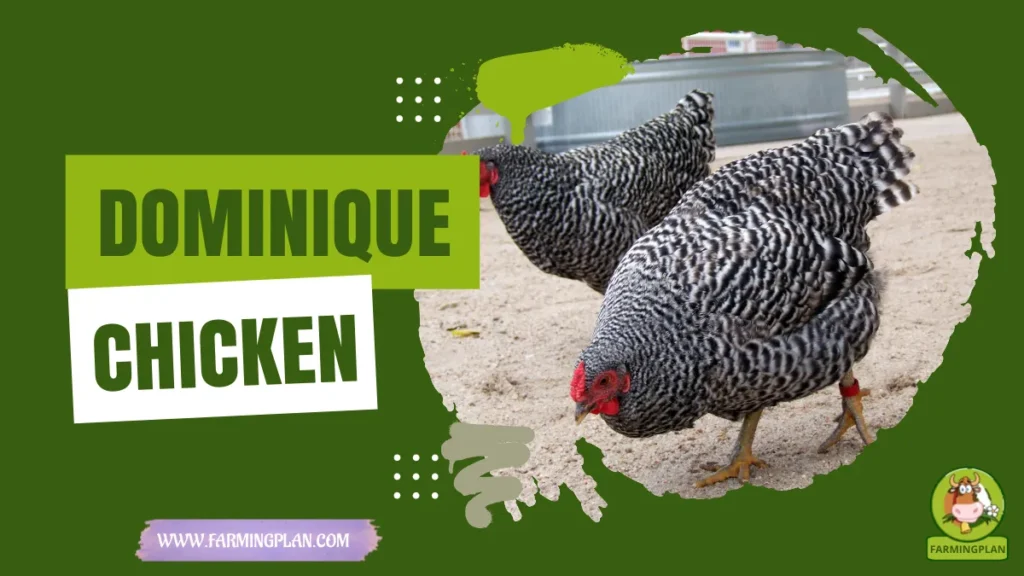If you’ve been around chickens as long as I have, you know the Dominique Chicken is no ordinary bird. This charming heritage breed, also lovingly called the dominicker chicken, has been roosting in American backyards for centuries. Known for its unique rose comb, calm nature, and reliable brown eggs, the Dominique chicken is a staple in the world of poultry. Whether you’re raising dominique chicks or admiring a dominicker rooster, you’re stepping into a rich legacy of American farming. In this article, I’ll walk you through everything from their history to daily care routines. Whether you’re a seasoned poultry breeder or just diving into chicken keeping, the Dominique chicken might just be the perfect feathered companion for your coop.

History & Origin of Dominique Chicken
The Dominique Chicken has quite the backstory. Often called the first truly American chicken breed, these birds were already scratching the soil back in the early 1800s. Some folks even claim they go as far back as Pilgrim times. Farmers favored them for their hardiness and dual-purpose utility, making them a staple on homesteads before the modern chicken era.
By the mid-1800s, the Dominique was well-known across the eastern United States. However, confusion struck when the Barred Rock chicken emerged, leading many to mistake one for the other. The key difference? That rose comb. The Dominique sports a compact rose comb, while the Barred Rock features a single comb. The American Poultry Association officially recognized the Dominique in 1874, and today, thanks to breeders and organizations like the Livestock Conservancy and Dominique chicken breeders, the breed is experiencing a well-earned revival.
Read More: Augsburger Chicken: How to Get Started
Characteristics of Dominique Chicken
Dominique Chickens are beautiful birds with a neat black-and-white barred feather pattern. That pattern creates a bit of a camouflage effect, which historically helped protect them from predators. Roosters weigh about 7 pounds, while hens come in around 5. They’re medium-sized but packed with personality.
The most notable trait? Their rose comb. It’s not just for show—it’s a practical feature that helps prevent frostbite in cold weather. Dominiques also have bright red wattles, yellow legs, and a slightly upright tail. When you see a dominique chicken hen in your yard, you’re looking at a piece of living history with both beauty and practicality. They’re also very cold hardy and adapt well to different climates, which makes them ideal for backyard chicken keeping.
Raise A Dominique Chicken And You’ll Raise A Feathered Friend, A Brown Egg Layer, And A Piece Of American History.
Nature & Temperament of Dominique Chicken
If I had to describe dominicker hens and roosters in one word, I’d say “easygoing.” These chickens are among the friendliest I’ve raised. They’re not flighty or overly aggressive, and they get along well with other poultry breeds. Even Dominique roosters tend to be less aggressive compared to some of the more territorial chicken breeds.
They’re curious birds, too. When I walk into the coop, they’re usually the first to waddle over to say hello. They’re great with kids and make ideal pets for families just starting with backyard chickens. They tolerate confinement well but enjoy a good forage session. If you’ve got a grassy run or open yard, they’ll love exploring.
Read More: Brahma Chicken: America’s First Meat Breed
Food & Diet of Dominique Chicken
Like any poultry breed, proper nutrition is key to keeping your Dominique chickens clucking along happily. I start my dominique chicks off with high-quality chick starter feed. Once they’re older, they transition to layer feed with at least 16% protein to keep those brown eggs coming.
I also give them kitchen scraps, cracked corn, and free-range time for natural foraging. Just avoid feeding them raw potatoes, chocolate, or anything moldy. Fresh water is a must—change it daily. Sprinkle in some oyster shell and grit to support digestion and eggshell production, and you’ll have a happy, productive flock.
Read More: Buckeye Chicken: A Breed of American Poultry
Usage & Purpose of Dominique Chicken
Dominique Chickens are true dual-purpose birds. That means they’re great for both egg production and meat. Dominique hens reliably lay around 230 brown eggs per year. That’s about 4 to 5 eggs a week, which is more than enough for most families.
When it comes to meat, Dominique roosters grow quickly and have flavorful meat. Back in the day, these birds were prized not just for eggs but as Sunday dinner too. Today, many folks raise them for eggs, poultry shows, or simply as charming backyard companions. I’ve seen them win ribbons in the American poultry show ring thanks to their classic looks and calm demeanor.
Special Features of Dominique Chicken
One of the coolest things about the Dominique is its rose comb. It helps the bird handle cold weather like a champ—a big bonus in northern regions. Plus, their barred feather pattern not only looks sharp but also helps them blend into natural surroundings, reducing predator attacks. Another standout? Their adaptability. From backyard coops to full-blown chicken farms, Dominiques fit right in. And let’s not forget their heritage. These birds are listed with the Livestock Conservancy as a heritage chicken breed, and that means raising them supports biodiversity and American poultry history.
Health Issues & Prevention
Dominique Chickens are hardy, but no breed is immune to health problems. I always keep an eye out for mites, lice, and worms. A monthly check under their feathers helps catch any early signs. Clean bedding and proper coop ventilation go a long way in disease prevention. Common poultry concerns like respiratory infections or coccidiosis can pop up, especially in wet or dirty conditions. I give my chicks medicated starter feed and keep adult birds in dry, clean quarters. Probiotic supplements in their water and an occasional garlic clove crushed in their feed help support their immune systems.
Step-By-Step Dominique Chicken Care Guide For Backyard Owners
Raising Dominique Chickens isn’t hard, but there are key steps to follow for a healthy and happy flock. Here’s my detailed care guide based on years of hands-on experience.
Step 1: Choose The Right Hatchery
Start with reputable sources like Cackle Hatchery or Meyer Hatchery. These places offer healthy Dominique chicks with strong genetics. Look for NPIP certification and positive customer reviews. Buying from a reliable hatchery reduces the chance of disease and ensures you’re getting true Dominique chickens—not a barred rock lookalike. I always order a few extra in case a chick doesn’t make it through the fragile early days.
Step 2: Build A Safe & Spacious Coop
Dominiques don’t need luxury condos, but they do need space. I recommend at least 4 square feet per bird inside the coop, and 10 square feet in the run. Install good ventilation and predator-proof fencing. Line the floor with pine shavings, and keep things clean to prevent respiratory issues. Provide sturdy roosts and nesting boxes with soft bedding. These hens love laying their brown eggs in cozy corners!
Step 3: Feed Them Right From Day One
Start with chick starter feed until they’re about 6 weeks old. Then switch to grower feed, and by 18 weeks, move them to layer pellets. Always provide grit and oyster shells for digestion and strong eggshells. I supplement their diet with greens, grains, and occasional protein like mealworms. Just keep treats under 10% of their total intake. Clean, fresh water is essential, especially in summer.
Step 4: Daily Care Routine
Each morning, I check food, water, and do a quick health scan. I collect eggs, clean out soiled bedding, and check for signs of parasites or illness. They love consistency, so stick to a schedule. Let them out to forage if it’s safe. At dusk, make sure everyone’s back inside and secure the coop. A little attention each day goes a long way toward keeping your flock thriving.
Step 5: Keep Up With Preventive Health
Dust baths help Dominiques stay parasite-free. I add diatomaceous earth to their favorite dirt patch. I also deworm every 6 months and rotate bedding materials to keep pests at bay. Make sure your coop stays dry. Wet, moldy bedding invites disease. Vaccinate when recommended, and don’t be afraid to consult a poultry vet if something looks off.
Expert Tips & Best Practices From My Chicken Yard
- Always check for the rose comb—it’s the true Dominique trait.
- Add apple cider vinegar to their water once a week for gut health.
- Use hardware cloth, not chicken wire, to keep out predators.
- Rotate your flock every 3-4 years to maintain genetic diversity.
- Participate in local poultry shows to learn and connect with breeders.
Tip: Never Underestimate The Power Of A Good Coop And A Happy Hen.”
FAQ
Are Dominique chickens good egg layers?
Yes! Dominique hens lay about 230 medium brown eggs per year and are consistent year-round.
What’s the difference between Dominique and Barred Rock chickens?
The main difference is the comb type. Dominiques have a rose comb, while Barred Rocks have a single comb.
Are Dominique chickens cold hardy?
Absolutely. Their rose comb and dense feathering help them tolerate cold weather better than many breeds.
Do Dominique chickens get along with other breeds?
Yes, they’re docile and friendly, making them ideal for mixed-breed backyard flocks.
Can I raise Dominique chickens in an urban backyard?
Definitely. They’re quiet, manageable, and great for small spaces with proper care.
Conclusion
Raising Dominique Chickens has been one of the most rewarding parts of my poultry journey. These heritage birds bring charm, reliability, and a whole lot of personality to any backyard. Whether you’re in it for the eggs, the show ribbons, or simply the joy of chicken keeping, Dominiques have something special to offer. Their rose comb, gentle temperament, and historic roots make them a standout choice for beginners and seasoned farmers alike. Ready to bring a little American poultry history into your yard? Give the Dominique Chicken a place in your coop, and don’t forget to share your experiences in the comments or with fellow poultry lovers online!

